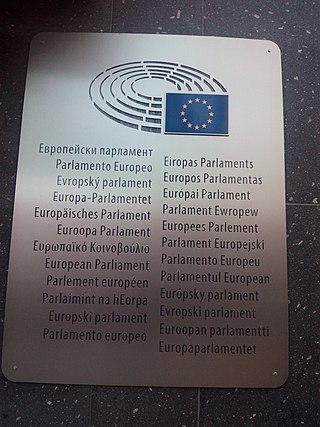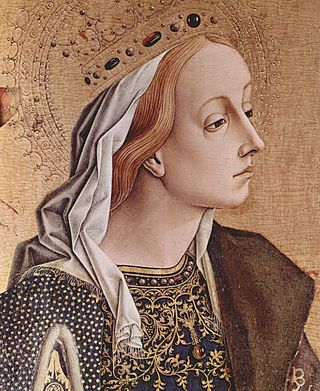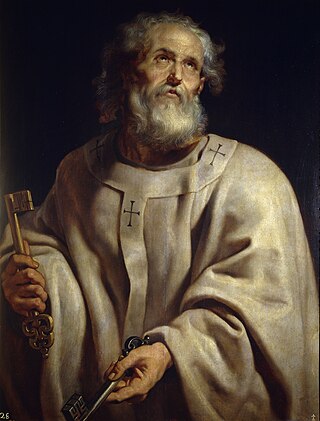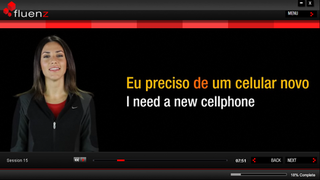Radio Canada International (RCI) is the international broadcasting service of the Canadian Broadcasting Corporation (CBC). Prior to 1970, RCI was known as the CBC International Service. The broadcasting service was also previously referred to as the Voice of Canada, broadcasting on shortwave from powerful transmitters in Sackville, New Brunswick. "In its heyday", said Radio World magazine, "Radio Canada International was one of the world's most listened-to international shortwave broadcasters". However, as the result of an 80 percent budget cut, shortwave services were terminated in June 2012, and RCI became accessible exclusively via the Internet. It also reduced its services to five languages and ended production of its own news service.

The European Union (EU) has 24 official languages, of which three – English, French and German – have the status of "procedural" languages of the European Commission. The three procedural languages are those used in the day-to-day workings of the institutions of the EU.
A regional language is a language spoken in a region of a sovereign state, whether it be a small area, a federated state or province or some wider area.

The English language in Europe, as a native language, is mainly spoken in the United Kingdom and Ireland. Outside of these states, it has official status in Malta, the Crown Dependencies, Gibraltar and the Sovereign Base Areas of Akrotiri and Dhekelia. In the Netherlands, English has an official status as a regional language on the isles of Saba and Sint Eustatius. In other parts of Europe, English is spoken mainly by those who have learnt it as a second language, but also, to a lesser extent, natively by some expatriates from some countries in the English-speaking world.
Language shift, also known as language transfer or language replacement or language assimilation, is the process whereby a speech community shifts to a different language, usually over an extended period of time. Often, languages that are perceived to be higher-status stabilise or spread at the expense of other languages that are perceived by their own speakers to be lower-status. An example is the shift from Gaulish to Latin during the time of the Roman Empire.
A national language is a language that has some connection—de facto or de jure—with a nation. The term is applied quite differently in various contexts. One or more languages spoken as first languages in the territory of a country may be referred to informally or designated in legislation as national languages of the country. National languages are mentioned in over 150 world constitutions.

Gollum browser is a discontinued web browser for accessing Wikipedia. Since 2017, Gollum is no longer accessible online.

J, or j, is the tenth letter of the Latin alphabet, used in the modern English alphabet, the alphabets of other western European languages and others worldwide. Its usual name in English is jay, with a now-uncommon variant jy.
Google Voice Search or Search by Voice is a Google product that allows users to use Google Search by speaking on a mobile phone or computer, i.e. have the device search for data upon entering information on what to search into the device by speaking.

Katherine, also spelled Catherine and other variations, is a feminine given name. The name and its variants are popular in countries where large Christian populations exist, because of its associations with one of the earliest Christian saints, Catherine of Alexandria.

Andrew is the English form of the given name, common in many countries. The word is derived from the Greek: Ἀνδρέας, Andreas, itself related to Ancient Greek: ἀνήρ/ἀνδρός aner/andros, "man", thus meaning "manly" and, as consequence, "brave", "strong", "courageous", and "warrior". In the King James Bible, the Greek "Ἀνδρέας" is translated as Andrew.

Peter is a common masculine given name. It is derived directly from Greek Πέτρος, Petros, which itself was a translation of Aramaic Kefa, the new name Jesus gave to apostle Simon Bar-Jona. An Old English variant is Piers.

Fluenz is a digital language learning platform developed by Fluenz Inc., a U.S. entrepreneurial company. The interactive content can be downloadable or accessed online on computers and mobile devices. The product range consists of programs to learn Spanish as spoken in Latin America, Spanish as spoken in Spain, French, Italian, Mandarin, German, and Portuguese.

Yandex Translate is a web service provided by Yandex, intended for the translation of web pages into another language.

Steve Kaufmann is a Canadian polyglot and internet personality known for his language-learning content on YouTube, and his online language-learning platform which he co-founded.










